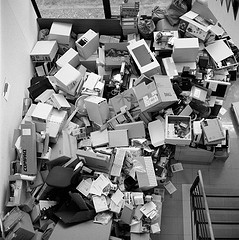Recycling Household Electronic Waste Is Easier Than You Think
June 2, 2015
Electronic Waste: An Inconvenient Reality
Chances are you probably have amassed a hefty chunk of electronic waste (e-waste) in your living space over the years. Dusty jewel cases filled with CDs, boxes of remote controls from TVs you junked long ago, and perhaps even a few old computers.
You’re not alone. Many people have a habit of holding onto dated electronics that they no longer use and, while the nostalgia of these items is appealing to some, for most it’s simply an annoyance. So, what do you do with that brick cell phone from the 1980s and early 90s?
Often times throwing smaller items in the trash seems like the most convenient solution, while hiding larger items out of sight in a basement or storage unit seems logical. However, the former option is harmful to the environment, while the latter simply creates unnecessary clutter.
Point being: Electronic waste is becoming more and more of an issue. In fact, and probably not surprisingly, it is the fastest growing municipal waste stream in the United States.
According to  an EPA published report, the United States generated nearly 2.4 million tons of electronic waste in 2009 and, of that, 75 percent went straight to landfills or was incinerated. Consequently, plastic, glass, and toxic materials—along with precious metals—are left to sit in landfills and opportunities to reuse these materials are missed.
an EPA published report, the United States generated nearly 2.4 million tons of electronic waste in 2009 and, of that, 75 percent went straight to landfills or was incinerated. Consequently, plastic, glass, and toxic materials—along with precious metals—are left to sit in landfills and opportunities to reuse these materials are missed.
Clearly there is plenty of room for improvement when it comes to getting rid of these types of products. But how easily can that be accomplished?
The answer might be surprising.
Many local big box electronics stores offer recycling for some of the aforementioned items. Some of them even provide trade-in programs as an incentive. At Best Buy, for example, many consumer electronics that were originally purchased through them can be traded in for a gift card. Office supply store, Staples, offers a similar program.
It really is as simple as that – and you’ll thank yourself for freeing up some space.

